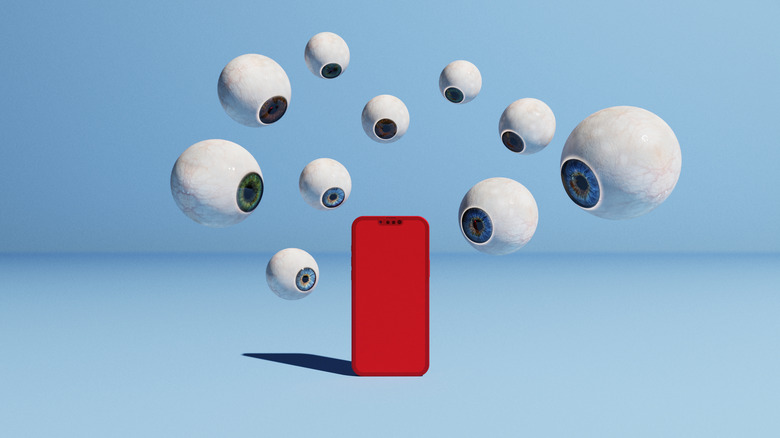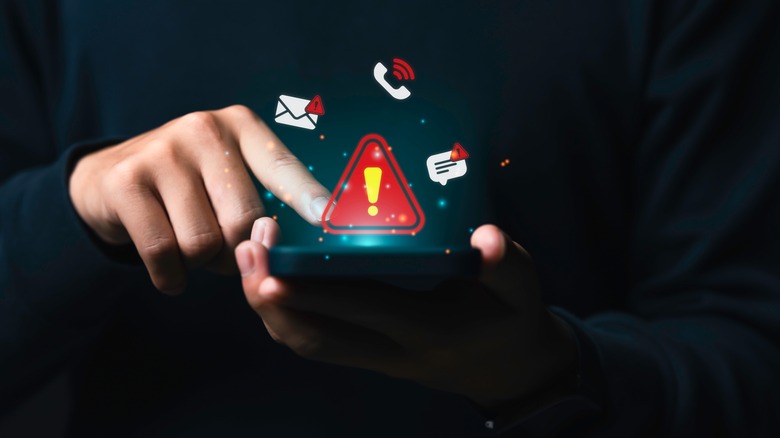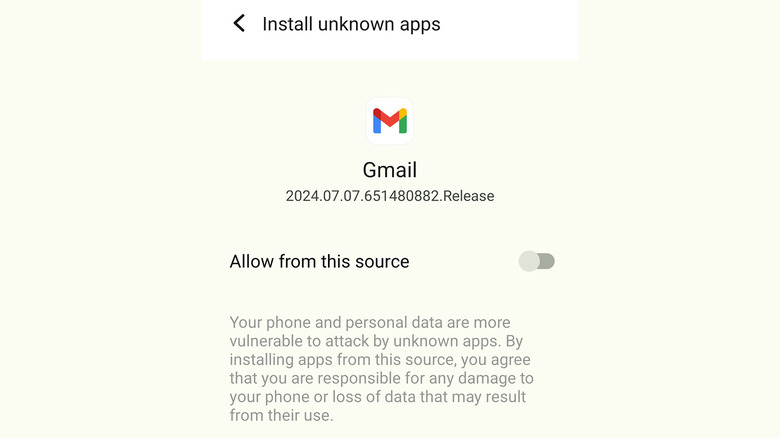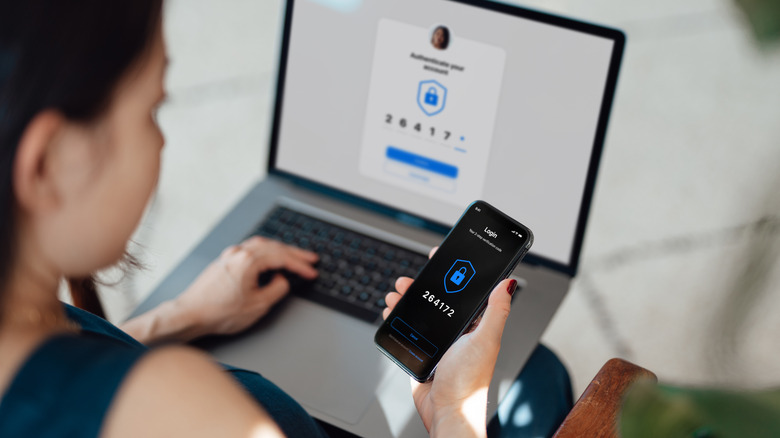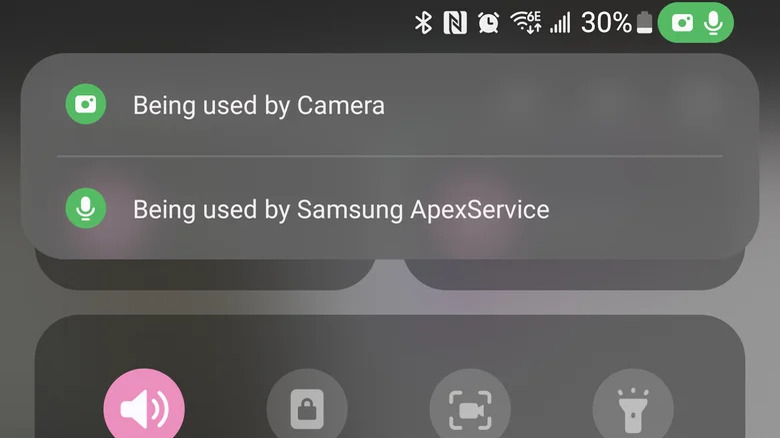Here Are The NSA's Top Recommendations To Keep Your Phone Safe From Spyware
Our intimacy with our phones means they are keys to the tiniest details of our lives. The level of confidence we have in these devices makes them perfectly capable of compromising our privacy discreetly, sometimes by the phone brands themselves, and other times by people with rogue intent. One of the common ways our phones can be used to siphon private and financial information is through spyware.
The term spyware is usually linked to high-profile espionage or political motives, such as in the case of the infamous Pegasus. But, in reality, it's fairly common to fall into the trap of being watched at your every step while using your phone. A spyware is a sneaky piece of code that exploits vulnerabilities on our phones without explicit consent. It can intrude into the through freely peddled apps, unsafe web browsing, or malicious links received through messages or email. Spyware often evades detection by stealthy installation and disguising as key OS files. It can impersonate system processes, hog up the resources, modify system settings, and exchange encrypted data using proxy servers.
However, basic digital awareness can prevent you from getting roped in. The National Security Agency (NSA) lays down some easy-to-follow yet important tips to keep our pocketable confidants from becoming digital peepholes.
Beware of freebies
The NSA has a few simple recommendations to keep sneaky spyware away. The first hygiene step begins with a healthy passcode to prevent anyone from accessing your phone when you leave it unattended. Treat your phone no less than a treasure chest and opt for a longer passcode than a four-digit one. A six-digit lock screen pin is difficult to crack, and you can make the process tougher by using a password with digits, letters, and symbols. Avoid using the same passcode or password for multiple devices.
Next, resist picking up lure candies in the garb of freeware. Do not download apps from unreliable sources, especially when a paid app is being offered for free from unreliable sources. Always use the Google Play Store on Android and the App Store on iPhones, as both platforms continuously inspect apps for potential spyware or other malicious injections. While third-party app stores give you the freedom to evade the exorbitant shares Google and Apple charge as part of subscriptions — thereby, increasing the costs for you — these stores can also host some unsafe apps, which can infect your phones.
Observe permission you allow
Furthermore, be mindful of the permissions that you grant and review the installed applications frequently. For instance, a Calculator application does not require your location access, so just deny the request while setting it up or revoke it for preinstalled apps. You must also routinely update installed apps to ensure any backdoor entries that hackers can use are patched by the developers. Similarly, update the firmware on your phone, particularly when it includes security updates.
Additionally, you can check for apps that may have access to install other apps on your phone, especially on an Android. While the exact terminology varies with each manufacturer, you can search for "unknown" under your phone's settings and revoke this permission from any app that doesn't need it or could potentially misuse it. Scan for other accesses such as displaying over other apps or modifying system settings. You must also check for these settings frequently if you share your phone with kids, elders, or anyone who is not very tech-friendly.
The NSA also recommends a simple yet effective solution to temporarily deflecting any spyware that might be living on your phone: power off and periodically. You can also schedule reboots with existing features in Android and iOS.
Don't fall for free Wi-Fi
In addition to a list of things you should do, the NSA also recommends things you must avoid. To begin with, remember to turn off Bluetooth when you're not using it as it can be used to connect unauthorized devices like Flipper Zero without you knowing it. The same goes for Wi-Fi. Avoid connecting to open or public networks, but if you absolutely must, use a VPN to conceal your location and keep your data safe. At no cost should you use banking or other critical apps on a public Wi-Fi.
Next, don't use public chargers, as seemingly harmless USB cables can be rigged with microchips that hack into your phone without your knowledge. In fact, they are very easy to buy online for as little as $120. That's why you must always carry a legit charger and cable with you in case you might need to charge your phone outside. Moreover, do not connect your any unknown removable drives to your phone and do not connect your phone to any computer that you don't own.
The next one goes without saying, but make sure you don't click on unsolicited email attachments or links. Even your friends and relatives may unintentionally send you spyware that has already infected their devices. Some telltale signs include typos and spelling mistakes in the website names or unusual URLs.
Tell if you're being heard and watched
Coming back to use apps with care, routinely clear all apps running in the background on your phone. In addition to malicious code, any legit app can also be used to spy on our physical surroundings by exploiting the microphone and camera permissions. Avoid having sensitive conversations with the phone in your vicinity and be wary of the green indicator on the top of your phone's screen, as it notifies you when the microphone is in use. Lastly, ignore every urge to jailbreak or root your phone unless you are well-versed with the repercussions.
While we don't intend to engage in fear-mongering, cyberattacks are getting increasingly more sophisticated, which is why you should take the steps we listed above to protect your sensitive information. Please keep in mind that while these measures can lower the risk of a security breach, they cannot guarantee complete protection against spyware. Ensuring your digital safety hinges on the extent of your curiosity and the knowledge you gather along the way.
